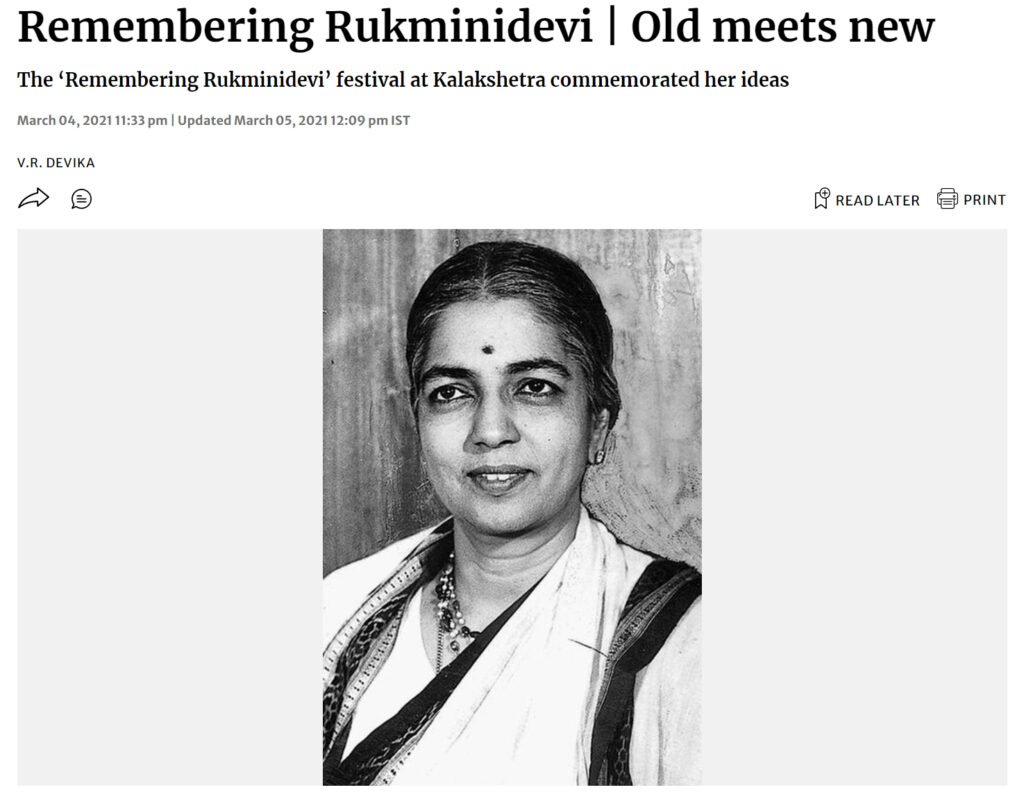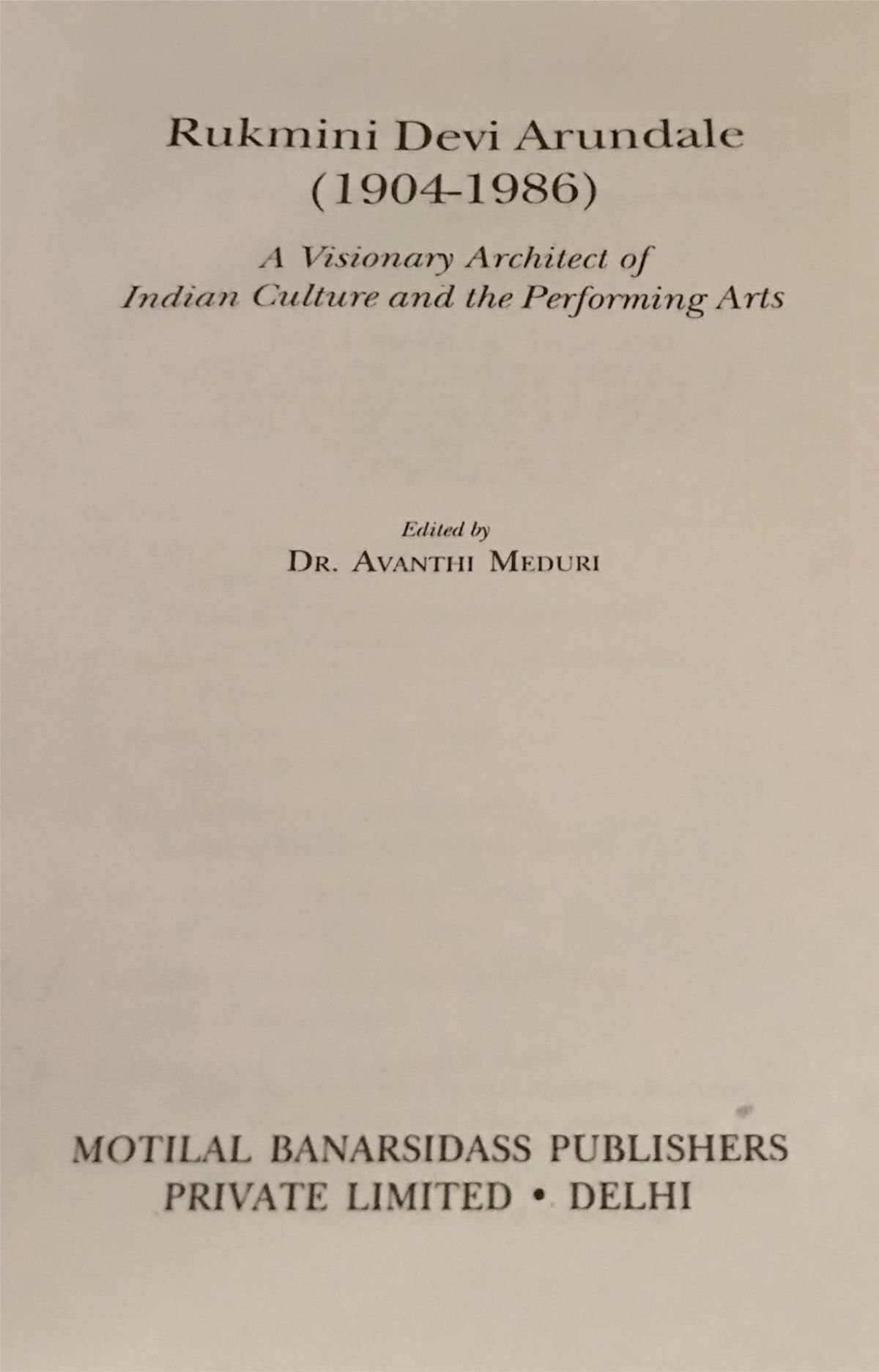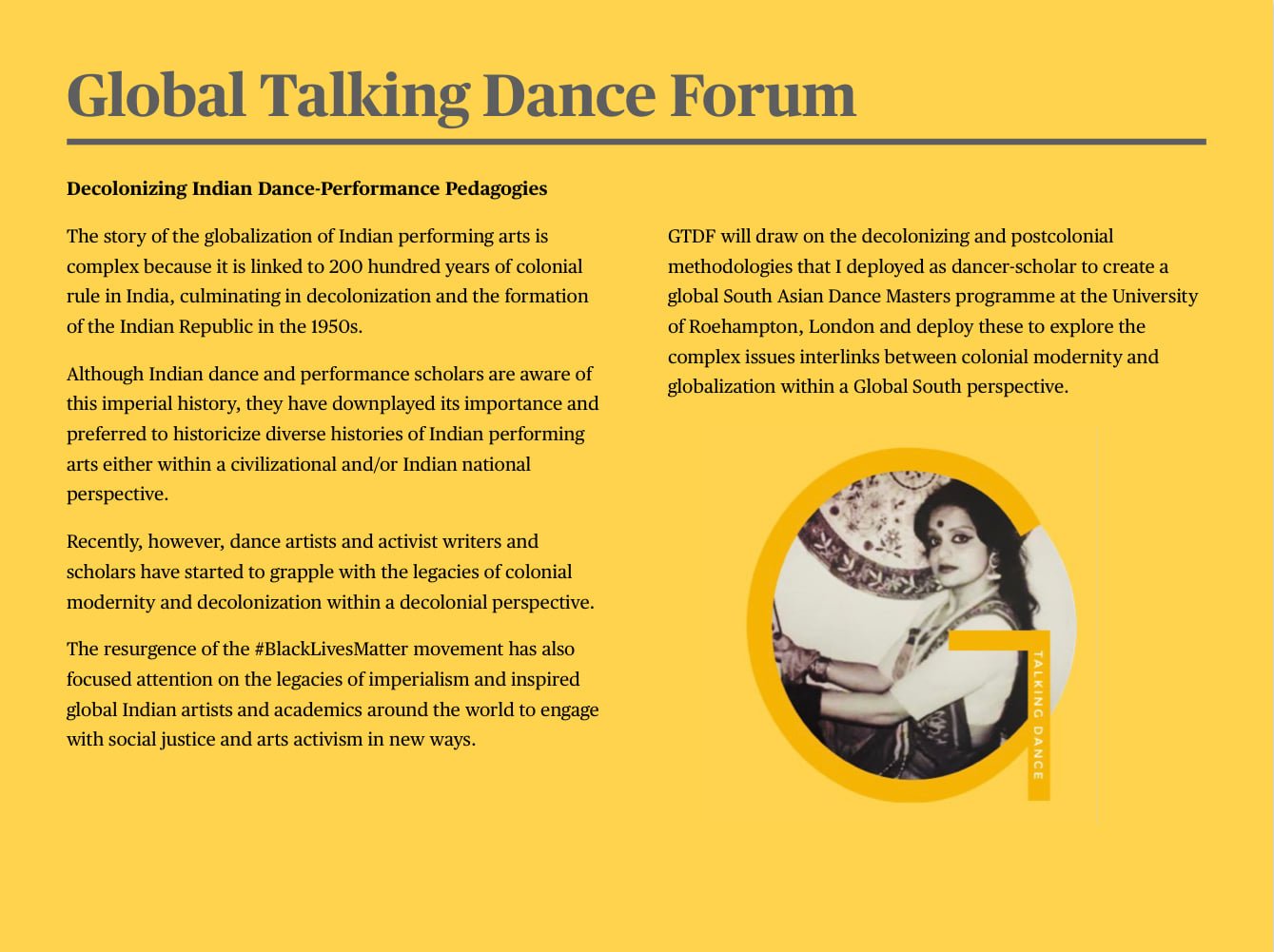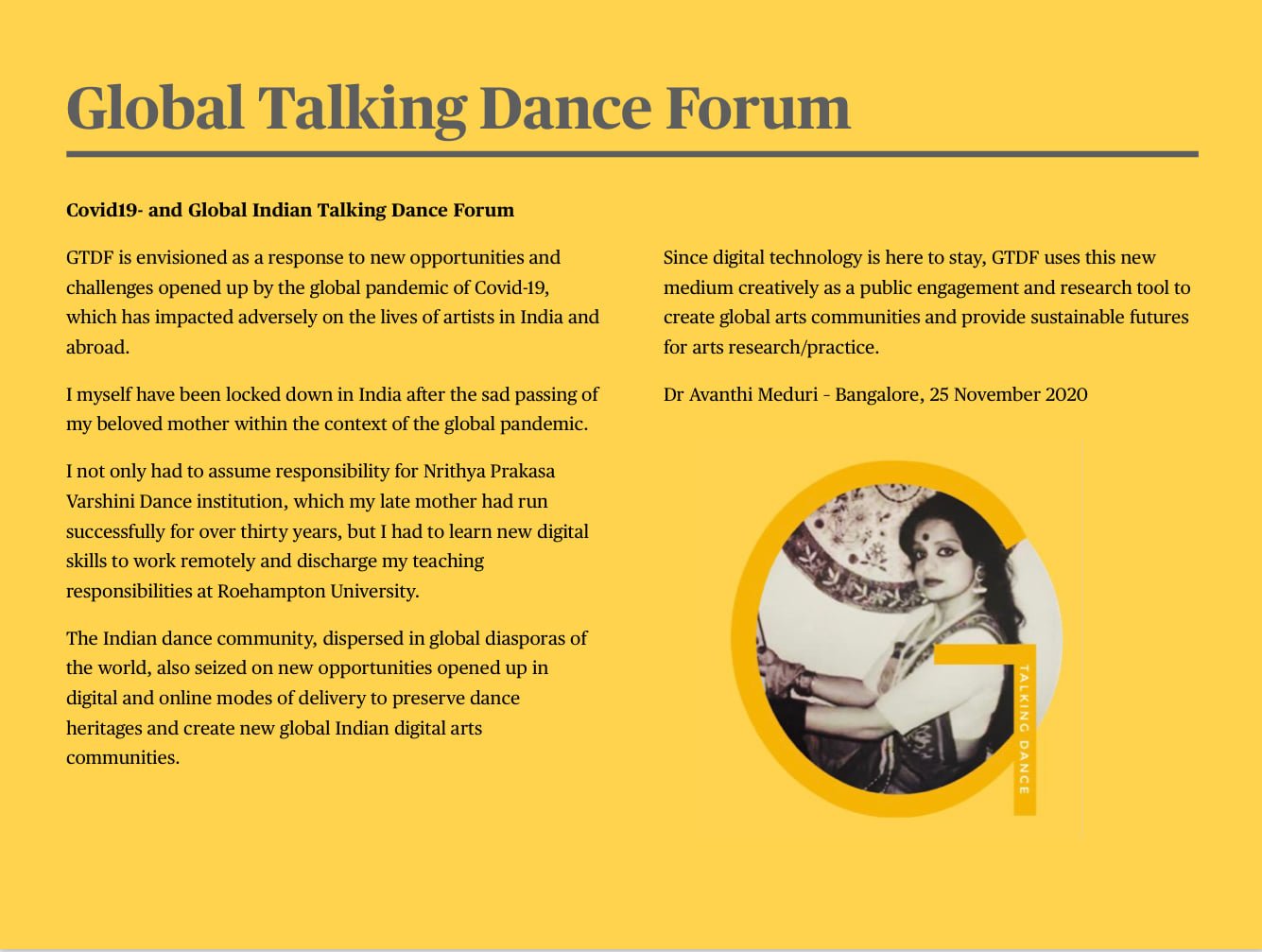Global Talking Dance Forum
23 March 2024
A talk on the appropriation of Bharatanatyam
Panelists – Sandhiya Ravishankar and Dr Avanthi Meduri
16 May 2023
The New Indian Express of Sunday May 14, 2023
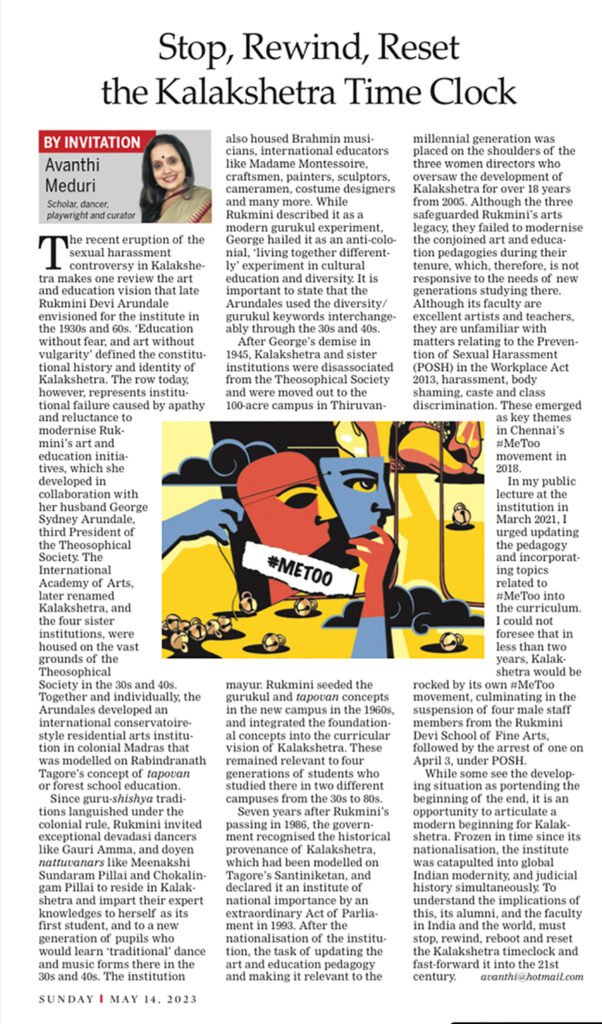
08 April 2023
#kalakshetrametoo #kalakshetrastudentrevolution

The Kalakshetra student body named four male perpetrators belonging to diverse castes, classes and linguistic backgrounds and wanted them to be dismissed and removed from campus immediately. Students alleged that these men were out of control. They prowled on vulnerable young boys and girls and harassed them sexually in the dance classroom, in residential cottages, and costume, theatre and dressing rooms. Students demanded that this abuse be stopped immediately and made their case on the ground of safety and self-protection, which they presented as their fundamental and statutory rights as students of Kalakshetra. To realize their objectives, the Kalakshetra student body addressed two key letters, one to the Union Minister of Culture, G. Kishan Reddy and the other to Shri M. K. Stalin, the Chief Minister of Tamil Nadu. Together and individually, students submitted more than 90 written complaints to the Police and requested police intervention to stop the culture of sexual harassment and abuse that has been going on in Kalakshetra since 2008.
The Gang of Four have now been suspended and one is in police custody. Bravo Kalakshetra students, bravo brave survivors and victims of sexual harassment, bravo for taking matters into your own hands and demanding the change and transformation you need and deserve as students of Kalakshetra. The Kalakshetra Administration is attempting damage control and trying to return matters to normalcy and business as usual. We are informed that Kalakshetra exams are being held hastily and without regard to the mental health and well-being of students.
The key issue now is to ensure that the student body is not threatened with disciplinary action for speaking out against the Kalakshetra Administration. Institutional silencing and reprisals must not be allowed as such acts have the potential to impact adversely on the mental health of the survivors and victims of sexual harassment and abuse. Efforts must also be made to facilitate a transparent review of the institutional culture of intimidation and the silencing of student concerns, which has been going on since 2008, and impacted negatively on the student body.
I urge the revision of the academic curriculum in Kalakshetra given recent concerns raised around the guru-shisha model of dance transmission, which needs updating and modernization. I suggested the creation of new dance history and theory modules when I was invited to speak at Kalakshetra at the Rukmini Devi Birth Centenary Celebrations in March 2021. But we could not pursue this matter at that time.
In my role as an arts educator and academic who has conducted many years of archival and ethnographic research on Kalakshetra, I have prepared a ‘list’ of recommendations to facilitate an in-depth historical review of the developmental vision of Kalakshetra, going back to 2008.
I want to submit this list of recommendations to appropriate bodies and invite you to share your views on this matter. You can email me at avanthi@hotmail.com, or just post your thoughts here on this thread.
Photo: Public domain.
04 March 2021
Remembering Rukmini Devi
Dear Friends,
Thank you all for your warm messages. Please find enclosed the link for the Talk on the Global Legacy of Rukmini Devi and Kalakshetra, which was presented at Rukmini Arangam on March 1, 2021. I am also attaching powerpoints slides as there was a small syncing problem with text. Please share widely with friends and arts community.
Best regards,
Avanthi
PDF of the slides used in the lecture can be accessed here:
01 March 2021
Kalakshetra Foundation celebrating 117th birth anniversay of Smt. Rukmini Devi
Kalakshetra Foundation is celebrating the 117th birth anniversary of it’s founder, Smt Rukmini Devi on 1st March, 8.30 am at Rukmini Arangam. Talk by Dr. Avanthi Meduri at the Kalakshetra Foundation on Monday, March 1st during the birthday celebrations of its founder, Rukmini Devi Arundale.
You are invited to a Zoom webinar.
When: Mar 1, 2021 08:30 AM India
Topic: Rukmini Devi Birthday Celebrations 2021

27 February 2021
Bharatanatyam as a Global Dance: Some Issues in Research, Teaching, and Practice
Essay by Dr. Avanthi Meduri – from the 2004 Dance Research Journal 36.
Click here to access the essay.
26 February 2021
Dr. Avanthi Meduri with the late President of India, Shri A. P. J. Abdul Kalam
New Delhi: Motilal Banarsidass
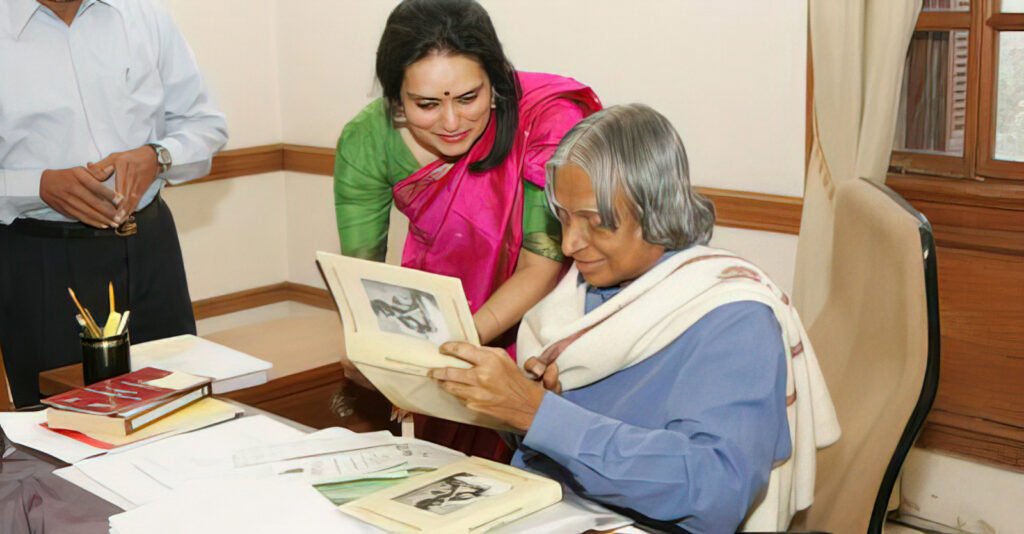
01 December 2020
All about Global Talking Dance Forum
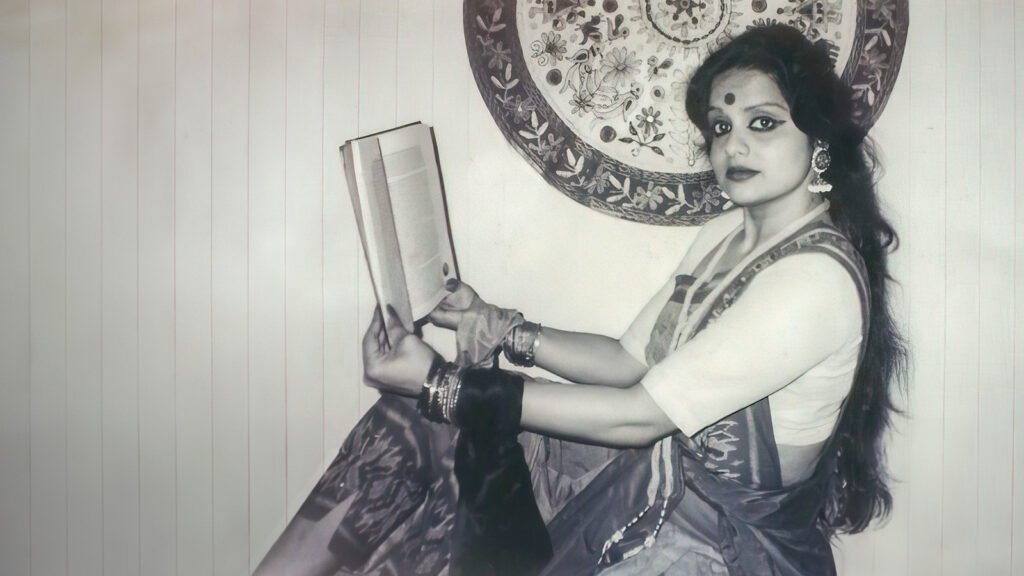
You can also access: https://globaltalkingdanceforum.wordpress.com/vision/ – for the text.
06 November 2020
Poetry in Motion - Spic Macay Panel Discussion
In the discussion, Valliji has eloquently clarified the relationship between Tradition and the Individual Artist; the status of Bharatanatyam in the global dance ecology, and pointed to abiding values of Shradda and Sadhana to inspire future generation of dancers. Enjoy the discussion
19 October 2020
Spic Macay Europe & Uk Chapter presents "Poetry in Motion" - A Panel Discussion

25 September 2020
Kapila Vatsyayan’s Global Vision
Click here to read the article that appeared in The Hindu
16 September 2020
Art Scholar Kapila Vatsyayan passes away
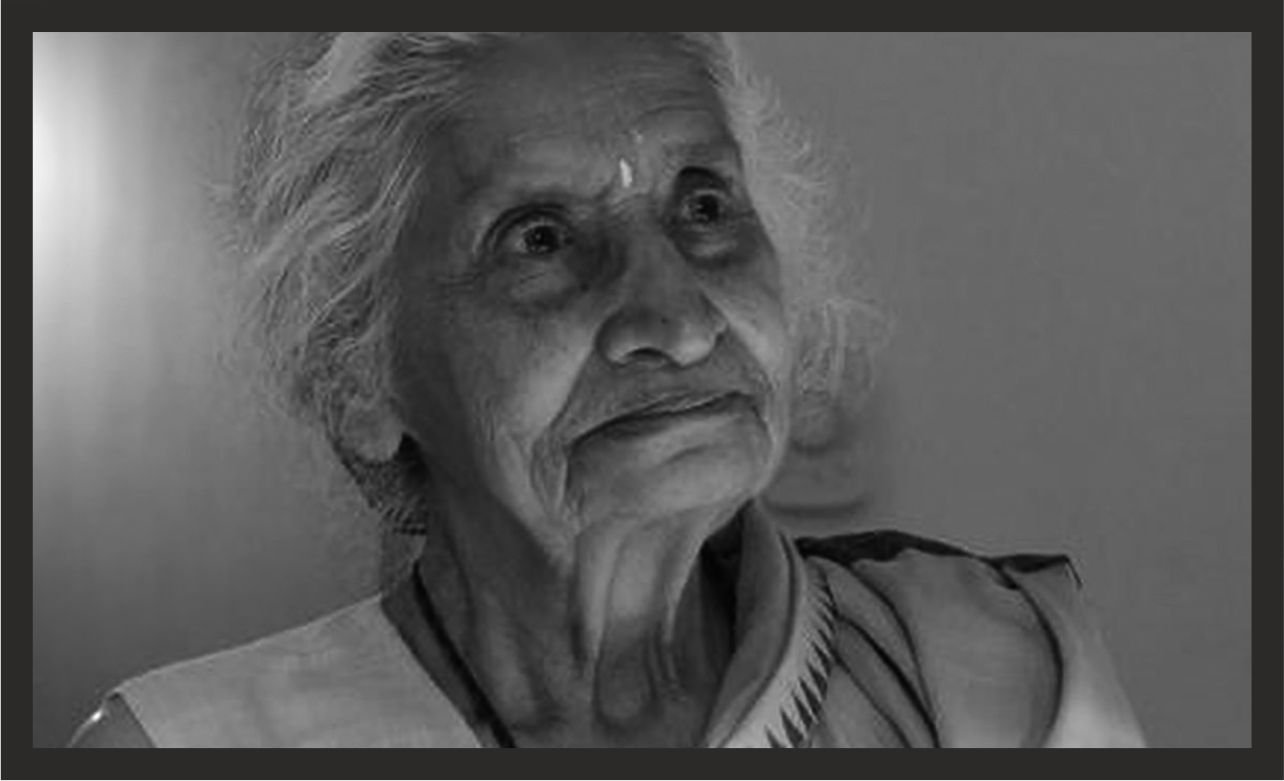
11 September 2020
Towards A Global Indian Dance Theatre Committee
This post is in response to Dr Srinath Nair’s comment on the Story of My Talking Dance Video posted on my FB page on August 28, https://www.facebook.com/avanthi.meduri/posts/1970771419732824
In the discussion, Valliji has eloquently clarified the relationship between Tradition and the Individual Artist; the status of Bharatanatyam in the global dance ecology, and pointed to abiding values of Shradda and Sadhana to inspire future generation of dancers. Enjoy the discussion
Your post reminded me of those good old days and how we established the Asian Performing Arts Consortia between the Universities of Roehampton, Royal Holloway and Lincoln and the many interesting international debates and seminars that we were able to hold under this formation.
You are absolutely right that Indian dance/theatre scholarship is heavily influenced by Western intellectual discourse and what you have identified as cultural hegemony. The exclusive focus on Caste and the Brahminical appropriation of subaltern traditions has not only engaged Western scholars since the long nineteenth century, but it has polarized Indian cultural production and prevented meaningful dialogue and progressive action in the field of Indian performing arts.
I agree that it is urgent, therefore, to re-examine Western intellectual hegemony and articulate, new practice-friendly paradigms and epistemologies for all of the classical dance theatre forms of India, Bharatanatyam, Kathak, Kathakali, Mohiniattam, Manipuri, Kuchipudi, Odissi, and Sattriya forms. All these forms are global today, albeit in uneven ways, and taught by South Asian dance gurus and teachers dispersed in the global diasporas of the world. Interestingly, none of the classical forms, including Bharatanatyam and Kathak, have been integrated into mainstream professional practice either in the US or the UK where I have lived and worked. These forms are taught primarily within a community arts framework and subsidized by private funding and through strategic collaborations forged with Indian dance gurus, private, public and national institutions.
Because of this long history of interconnections between local and global stakeholders, I believe it would be timely to constitute a Global Indian Classical Dance Theatre Forum in collaboration with Indian faculty, dance gurus, and leading national dance-theatre organizations in India, US and the UK. I have been engaged in these conversations over the last two years and I think the time is ripe to do this now.
Cultural Translation as New Paradigm
To begin this conversation, I focused on imperial dance keywords and advanced ‘cultural translation’ as a new dance theatre and performance paradigm in the Talking Dance live show on July 30. I proposed this paradigm—which is a key concept in postcolonial and decolonial criticism–because dance teachers and artists use this model, both unconsciously and consciously, to transmit and stage classical forms in India and abroad. Additionally, I used this paradigm to create the first global South Asian Dance Masters at Roehampton University, London in 2005.
I wanted to speak about the versatility of this paradigm and the diverse ways in which cultural translation can be used as a trans-national paradigm but could not proceed because I was trolled and faulted for not addressing my Brahmin privilege and subject positionality. But my cyber bullying and trolling story was overshadowed the publication of another, bigger bullying story published by Dr Swamarnamalya Ganesh on August 3.
While I had wanted the Talking Dance Series to create discussion around dance history, devadasi, politics, identity and privilege, I never imagined that these topics would be transformed into real life dramas for so many actors and as noted aptly in Dr Anita Ratnam’s editorial comments in her Narthaki.com review. If you have any feedback or comment on how to develop this Global Indian Dance Theatre Forum to make it more inclusive and relevant to our contemporary times, please do respond on this page, or privately to myself and/or Dr Srinath.
I look forward to hearing from you,
Best regards,
Second Post from my Mother’s Studio
Towards a Global Indian Dance Theatre Committee
Copyright ©: Avanthi Meduri Sept 6, 2020
28 August 2020
The Story of My Talking Dance Video
The Talking Dance Video, co-produced by Dr. Swarnamalya Ganesh and myself, was trolled by a graduate student, who I shall call KN to protect his identity. Although I do not know KN, he is an ally of Nrithya Pillai, a distinguished Bharatanatyam artist, belonging to the hereditary Isai Vellalar community of artists and also a friend of Dr Davesh Soneji, acclaimed author of Unfinished Gestures.
The trio are not just associates, but linked with each other through social media networks and specific forms of cultural and political allyship. Together and individually, the trio became involved in my cyber bullying and I became the target of an unprecedented level of hate speech, caricature and vitriol which was directed at me in the first week of August.
Despite this attempt to sabotage the launch event, the Talking Dance Video, has registered over 10k views, 107 reactions and 143, which is surprising given that neither Swarnamalya nor I have actively marketed the video in the aftermath of July 30.
I come forward now, and after the dust has settled, to tell you the story of the Talking Dance Video. I do this to provide a timeline for myself and also for my friends and students who are following this story. My story is interesting because it is complex and focuses attention on global dance networks and how these become invested with the power to make and unmake lives and reputations. This is how it my story unfolded…
The Story of My Talking Dance Video
On the morning of July 30, KN exchanged tweets with Nrithya Pillai and her supporters, and queried the title of the poster, ‘Can we talk, Swarnamalya? The title was perceived as a ‘gimmick,’ staged to conceal the Brahmin privilege of the speakers and deployed with cunning to intimidate Nrithya Pillai, who was not part of this conversation. Offended by this perceived gimmick, Nrithya Pillai and KN, resolved to call out this Brahmin privilege—captured in the poster title– and with view to cancel the Talking Dance Series.
KN and Nrithya Pillal discredited my many years of research as a postcolonial and decolonial dance historian by falsely asserting that no one had heard of me. This is fake news because all the collaborators in DS network, including Dr Soneji, Dr Hari Krishnan, Dr. Sri Vidya Natarajan, and Rex, know my work. All KN had to do was to ask. My bio is also in the Bharatanatyam Reader (2010), edited by Soneji in which I have an essay, and is acknowledged in Soneji’s Unfinished Gestures (2011). Alternatively, KN could have googled me to learn about the global, postcolonial South Asian Dance Masters that I had created in the UK, focused on cultural translation and imperial dance keywords. But KN did not care to do his homework.
To bring down the Talking Dance series, KN spliced the images and words of the live video, without permission, which is a violation of copyright law, caricatured and lampooned it on Twitter. KN’s commentary foregrounded my Brahmin ‘caste privilege,’ detected in my Tamil/British accent and labelled me as UK Mami. Since Swarnamalya and I were homogenized into the universal stereotype of the Mami, our intergenerational speech was not distinguished and the video became the ground for the generation of more than 10 caricatures, which circled around the thematic of our Brahmin Mami privilege.
Each single tweet from KN’s twitter handle reached 8000 people and was distributed to 800 followers, who could then share it with their followers. Caught up in his own game of tweeting and retweeting, KN did not stop to consider the negative impact these tweets would have on my life, my career, mental health and possibly my job. While I recognize that social media creates its own toxic world, I also know that my colleagues, who are active on these portals, use this tool judiciously and seek permission to share twitter tweets and FB posts so as to not inflict damage on lives and reputations.
Since KN had labelled me as UK Mami, Nrithya Pillai and her powerful network of Dalit activists and Bahujan allies began lampooning my name, the talk and the poster and produced three specific caricatures. Nrithya Pillai focused on my surname and caricatured this as “Medhuvada” and lampooned my talk in the metaphor of the Samosa, which I had invoked to allude to the multilingual diversity of Indian culture. The third lampoon focused on the title of the poster and asked if non-Brahmins can “fart on all things appropriated.”
I was distressed to receive this hate speech from Nrithya Pillai, who I have never met, but whose work I respect deeply. Yet I recognized that this verbal assault and caricature was not personal, but political and represents a struggle to claim voice, agency and representation.
Even as I was thinking through the political implications of hate speech, historical trauma, and my own desire/anxiety to speak about my postcolonial research in this fraught context, Swarnamalya posted her own bullying story on her FB page on the morning of August 3. I was not involved in this story and Swarnamalaya did not inform me of her intent to publish her story. Swarnamaly’s narrative was huge because it named Dr Soneji, B.M. Sundaram, Dr Hari Krishnan, Dr Sri Vidya Natarajan, and Rex as the ‘gang’ that had hounded her from 2013.
I was distressed to read this narrative because it involved Swarnamalya, Nrithya Pillai and Dr Soneji, a longstanding colleague, with whom I shared a professional relationship of solidarity going back to the late 1990s.
Towards Resolution
On August 6, I read Dr Soneji’s formal response to Swarnamalya’s allegation of bullying, which was posted on Nrithya Pillai’s FB wall, and retweeted by her to KN’s twitter account. Why was Dr Soneji posting his important refutation letter, not on his own FB page, but on Nrithya Pillai’s wall and why was this post then retweeted to KN’s twitter handle? I suddenly understood how this interlocked chain of cyber distribution operated: it travelled from Nrithya Pillai to Dr Soneji through the conduit of KN’s twitter account and was realized in the name of allyship and solidarity. I was dismayed. While I was able to forgive the irresponsible ‘Tweeting Twitters’ of KN, I was saddened to realize that Dr Soneji, my trusted colleague was actually a bystander and had done nothing to stop my cyber caricatures, which constitutes in legal terms, slander through public defamation. I felt betrayed.
On August 7, I wrote Dr Soneji, requested that KN be cautioned and asked that an apology be posted on his twitter handle as his reckless tweets had been dispersed widely and had inflicted huge reputational damage on me.
I also clarified that I did not wish to raise any complaint against KN as I had no desire to censor a genuine critique, nor to police online activities of a graduate student. I also did not want this single act of indiscretion to have a negative impact on KN’s career, which was just beginning.
Dr Soneji intervened immediately and KN’s twitter handle was brought down within a span of less than two days. But I have not received an apology, nor am I able to post the letters I wrote to Dr Soneji nor his responses on my FB page as I have not received Soneji’s permission to do this in the moment.
Addendum
Although my trolling had a short run of no more than eight days, it demoralized and created huge negative strain on my life. Yet the story itself is unfinished as the full impact to reputational damage and feeling will only be revealed in the future.
In closing, I must address two specific objections, raised in relation to the Talking Dance Video. The first relates to the poster title, ‘Can we talk, Swarnamalaya,?’ which was perceived by Nrithya Pillai and her allies as a gimmick staged to conceal my Brahmin privilege and absolve myself of the responsibility of having to deal with it publicly in the live video event.
KN, the expert tweeter, also faulted me for not disclosing my ancestral privilege, specifically, that I am the great granddaughter of the very famous Tanguturi T. Praskasam, the first chief minister of Madras and Andhra Pradesh, also known as Andhra Kesari. Since my grandfather was directly involved in the twentieth century revival of Bharatanatyam, it would have been appropriate to check my privilege at this place, which I failed to do, and this too was an unfortunate mistake.
Finally, I wish to apologize for any unintended hurt I may have caused to Nrithya Pillai, KN, Bahujan and Dalit viewers by not acknowledging my Brahmin privilege/positionality in the live event of the Talking Dance Video. I am ready and able to engage this question of Brahmin privilege in a public forum with Indian dance historians and leaders of the fraternity, which has been recently conflated with White racism and privilege. I think it would be useful for the Indian dance fraternity to sit down and have this difficult conversation about ‘Caste/privilege because it manifests as a global issue of our global dancing times. Caste/privilege is also a question that GN want to engage as a social justice issue of their times.
Can we talk about Caste/privilege in Indian Classical Dance History?
I do hope this will be possible …
Best regards
Dr Avanthi Meduri
First Post ‘From My Mothers Studio’
Copyright: Avanthi Meduri
23 August 2020
From the Attic
A panel discussion between Avanthi Meduri & Swarnamalya Ganesh
